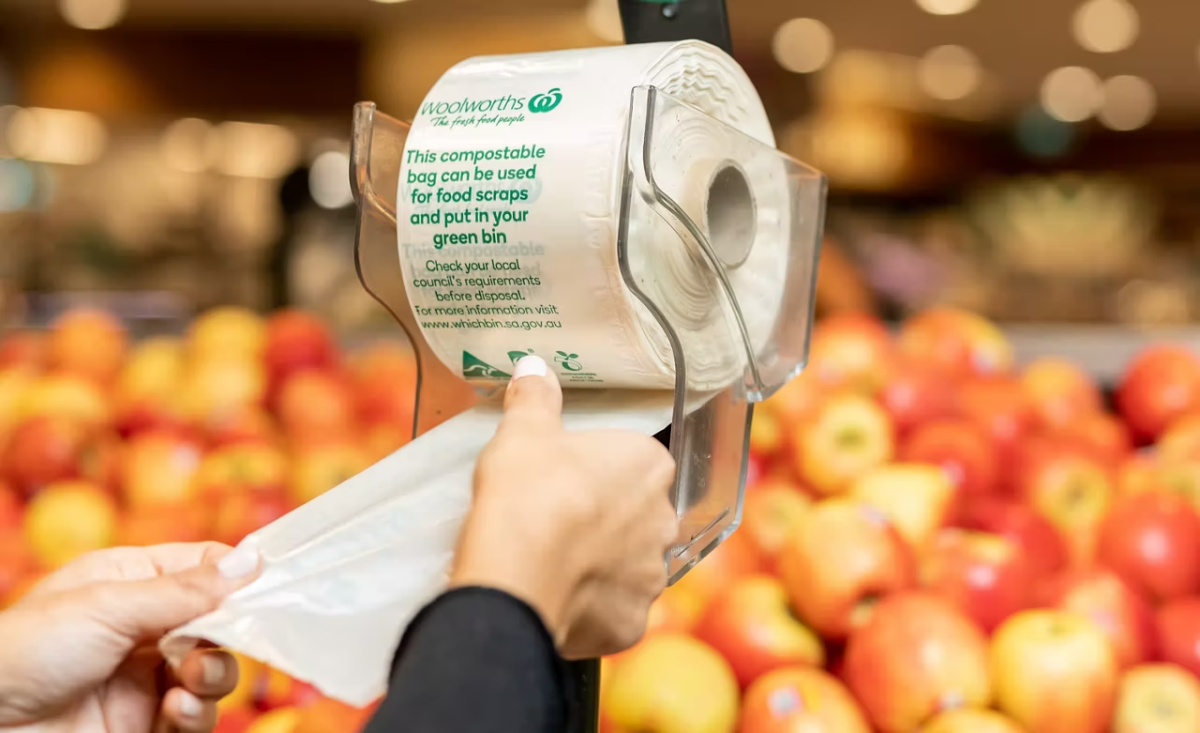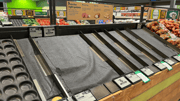
The next time you reach for those flimsy little bags in the fruit and vegetable section at Woolies or Coles, you might notice something different. In Western Australia, the government has expanded its ban on non-compostable plastic barrier bags, extending restrictions to cover nuts and confectionery, building on earlier rules that prohibited these bags for loose fruit and vegetables in October 2024.
But don't worry—the change isn't as dramatic as you might think, and there are some genuine benefits worth understanding.
What's actually changing in your shopping routine
Coles has removed single-use fresh produce plastic bags in all stores across Western Australia, in line with the next stage of the State's plastic ban which comes into effect on 1 September—a change that will remove 36 million conventional plastic produce bags from circulation annually in WA alone.
Both major supermarket chains have switched to compostable alternatives. The change introduced across Coles' 101 Western Australian stores will reduce the number of conventional plastic bags in circulation and help encourage home composting.
Made from compostable materials including natural plant starch, the new clear bags carry the Australasian seedling logo, which certifies their 'compostability' as per the Australian Standard.
Woolworths confirmed similar changes, offering compostable bags across all WA stores from 1 October. The good news? If you shop at ALDI, nothing changes—their produce bags already meet the new standards.
'Western Australians have shown strong support for reducing plastic waste and this next phase of the barrier bags ban is another important step forward'
The cost reality: What this means for your budget
Here's where it gets practical for household budgets. Certified home compostable produce bags break down anywhere in 6 weeks to 4 months, and cost from $0.11 each when purchased separately.
While the supermarkets provide these new bags free at point of sale, there's a broader cost consideration many seniors are discovering.
Consumer advocacy research found that in 78 per cent of cases, the loose fresh produce was more expensive per kilo than the pre-packaged items.
This creates an interesting dilemma—the environmentally friendly option of buying loose produce often costs more than pre-packaged alternatives.
Smart shopping tip for seniors
Consider bringing your own small containers or mesh bags for nuts, dried fruits, and smaller items. Many retirees find this not only saves on bag costs but also helps with portion control and reduces waste at home.
The composting confusion: Where do these bags actually go?
Here's where things get a bit tricky, and it's important to get this right. Since the NSW EPA has banned compostable packaging from being disposed of in the FOGO (Food Organics Garden Organics) green bin, only 8 per cent of Australians (in 43 councils) can properly dispose of commercially compostable packaging in their residential FOGO compost collections.
This means that despite being labelled 'compostable,' many of these bags may still end up in regular rubbish if your council doesn't accept them in green bins.
Unless consumers have an easy way to actually composting them, they actually just add to Australia's plastic waste problem.
Before you assume you can toss them in your green bin, check with your local council. Some are concerned about contamination risks if the bags don't break down properly during processing.
Making the most of compostable bags
- Check your council's guidelines before putting them in FOGO bins
- Use them as kitchen caddy liners for food scraps collection
- If you have a home compost system, they break down in 6 weeks to 4 months
- When in doubt, they can still go in regular rubbish (better than traditional plastic)
- Consider reusable mesh bags for multiple shopping trips
Success stories from South Australia
South Australia has been the testing ground for this change, with both big retailers exchanging single-use produce bags for compostable versions in South Australia in 2023 and 2022, respectively. The results have been genuinely impressive.
Since Woolworths made the switch in SA, 70 tonnes of plastic waste have been diverted from landfill each year.
That's the equivalent of about 3.5 million individual plastic bags no longer ending up in landfills annually in just one state.
The transition has been remarkably smooth for most shoppers, with many barely noticing the difference in day-to-day use.
The new bags feel similar to the old ones and perform the same function—they just happen to break down naturally when disposed of properly.
What's coming next: The bigger picture
There are plans to extend the ban next October to include plastic produce bags used for loose meat, seafood and dairy products.
This is part of a broader national push—the federal government has committed to ensuring 100 per cent of Australian packaging is recyclable, compostable or reusable by 2025.
Before the initial restrictions, WA residents used 115 million produce bags annually. When you consider that Australians produce over 150kg plastic waste per person, with consumption increasing 60 per cent — from an estimated 92kg per person in 2000, to 148kg per person in 2020—21, these seemingly small changes add up to significant environmental benefits.
Practical tips for adapting to the change
The transition is easier than you might expect, but here are some strategies that have worked well for other seniors:
Bring backup options: Small mesh bags or containers can be reused many times and work particularly well for nuts, dried fruits, and delicate items like berries.
Consider pre-packaged when it makes sense: With loose produce often costing more per kilo, don't feel guilty about choosing pre-packaged options when they offer better value, especially for items you use regularly.
Use the bags at home: The bags can be reused at home to collect food scraps and return to the earth as harmless organic matter, in a home compost bin or green bin (check with your local council).
Plan your portions: Without the unlimited supply of free plastic bags, many shoppers find they're more thoughtful about quantities, which can actually help reduce food waste.
The environmental win that matters
While the practical adjustments are minimal, the environmental impact is significant. Every year more than six million tonnes of rubbish is dumped into the world's oceans, 80 percent of this being plastic bags.
Australians throw away about 7,150 recyclable plastic bags a minute, with 429,000 recyclable plastic supermarket bags dumped into landfill every hour.
The new compostable bags are made with plant-based bio-resins derived from cornstarch or sugarcane, designed to break down leaving behind no toxic residues.
When filled with appropriate matter and disposed of in a home or commercial compost, they decompose into nutrient-rich compost, enriching the soil and closing the loop in the circular economy.
For a generation that has witnessed significant environmental changes throughout their lives, this represents a practical step toward addressing plastic pollution that doesn't require major lifestyle changes.
What This Means For You
The changes might seem small when you're doing your weekly shop, but they're part of a broader shift toward sustainability that many Australians are embracing. Whether you're popping in for a few items or doing the full family grocery run, the new compostable bags work just as well as the old ones—they just happen to be kinder to the planet when their job is done.
Have you noticed the change to compostable bags in your local supermarket? How are you finding the transition, and have you discovered any clever workarounds for making your shopping routine even more environmentally friendly?
Original Article
https://au.news.yahoo.com/woolworth...impacting-millions-of-shoppers-040400075.html
Western Australia expands ban on plastic barrier bags
Cited text: The State Government of Western Australia has expanded its ban on non-compostable plastic barrier bags, extending restrictions to cover nuts and confe...
Excerpt: the government has expanded its ban on non-compostable plastic barrier bags, extending restrictions to cover nuts and confectionery
https://www.hortidaily.com/article/9771048/western-australia-expands-ban-on-plastic-barrier-bags/
Western Australia expands ban on plastic barrier bags
Cited text: The measure builds on earlier rules that prohibited these bags for loose fruit and vegetables in October 2024.
Excerpt: earlier rules that prohibited these bags for loose fruit and vegetables in October 2024
https://www.hortidaily.com/article/9771048/western-australia-expands-ban-on-plastic-barrier-bags/
Coles rolls out compostable fresh produce bags in support ...
Cited text: Thursday 29 August 2024 · Coles has removed single-use fresh produce plastic bags in all stores across Western Australia, in line with the next stage ...
Excerpt: Coles has removed single-use fresh produce plastic bags in all stores across Western Australia, in line with the next stage of the State's plastic ban which comes into effect on 1 September—a change that will remove 36 million…
https://www.colesgroup.com.au/news/...ating-a-more-sustainable-and-plastic-free-wa-
Reusable paper bags and our work toward more sustainable packing | Coles
Cited text: The change introduced across our 101 Western Australian stores will reduce the number of conventional plastic bags in circulation and help encourage h...
Excerpt: The change introduced across Coles' 101 Western Australian stores will reduce the number of conventional plastic bags in circulation and help encourage home composting.
https://www.coles.com.au/about/sustainability/environment/bagging-information
100 per cent Certified Home Compostable Produce Bags from $0.11!
Cited text: Made in South Australia, our certified home compostable produce bags break down anywhere in 6 weeks to 4 months. Cheap, effective, better for the envi...
Excerpt: Certified home compostable produce bags break down anywhere in 6 weeks to 4 months, and cost from $0.11 each
https://www.compostablealternatives.com.au/product/home-compostable-produce-bags/
Supermarkets swap plastic for compostable bags, but risks remain
Cited text: “We found [in our 2023 report] that in 78 per cent of cases, the loose fresh produce was more expensive per kilo than the pre-packaged items,” Jones s...
Excerpt: Consumer advocacy research found that in 78 per cent of cases, the loose fresh produce was more expensive per kilo than the pre-packaged items
https://www.thenewdaily.com.au/finance/consumer/2024/09/03/supermarkets-compostable-bags
Better Understanding Compostable Packaging in Australia in 2025
Cited text: However since the NSW EPA has banned compostable packaging from being disposed of in the FOGO (Food Organics Garden Organics) green bin, only 8 per cent of Au...
Excerpt: Since the NSW EPA has banned compostable packaging from being disposed of in the FOGO (Food Organics Garden Organics) green bin, only 8 per cent of Australians (in 43 councils) can properly dispose of commercially compostable packaging in their…
https://www.compostablealternatives.com.au/compostable-packaging-in-australia/
Supermarkets swap plastic for compostable bags, but risks remain
Cited text: Compostable produce bags might seem like a step in the right direction, but unless consumers have an easy way to actually composting them, they actual...
Excerpt: Unless consumers have an easy way to actually composting them, they actually just add to Australia's plastic waste problem
https://www.thenewdaily.com.au/finance/consumer/2024/09/03/supermarkets-compostable-bags
Supermarkets swap plastic for compostable bags, but risks remain
Cited text: It follows both big retailers exchanging single-use produce bags for compostable versions in South Australia in 2023 and 2022, respectively.
Excerpt: with both big retailers exchanging single-use produce bags for compostable versions in South Australia in 2023 and 2022, respectively
https://www.thenewdaily.com.au/finance/consumer/2024/09/03/supermarkets-compostable-bags
Compostable Packaging: Solution for Australia’s Circular Economy
Cited text: Businesses using TIPA’s solutions also contribute to the National Packaging Targets for all packaging to be recyclable, compostable, or reusable by 20...
Excerpt: the federal government has committed to ensuring 100 per cent of Australian packaging is recyclable, compostable or reusable by 2025
https://tipa-corp.com/blog/compostable-packaging-solution-australia-circular-economy/
Australasian Bioplastics Association Applauds Federal Government’s Commitment To 100 per cent Recyclable, Compostable Or Reusable Australian Packaging By 2025—ABA Australasian Bioplastics Association
Cited text: The Australasian Bioplastics Association (ABA) welcomes and applauds the announcement from Federal Energy and Environment Minister Josh Frydenberg tha...
Excerpt: the federal government has committed to ensuring 100 per cent of Australian packaging is recyclable, compostable or reusable by 2025
https://bioplastics.org.au/australa...mpostable-reusable-australian-packaging-2025/
The Economics of Compostable Bags: Worth the Investment? | Ecopack Australia
Cited text: It's estimated that Australians produce over 150kg plastic waste per person. Our consumption has increased 60 per cent — from an estimated 92kg per person in ...
Excerpt: Australians produce over 150kg plastic waste per person, with consumption increasing 60 per cent — from an estimated 92kg per person in 2000, to 148kg per person in 2020—21
https://www.ecopack.com.au/blogs/bl...ompostable-bags-are-they-worth-the-investment
100 per cent Certified Home Compostable Produce Bags from $0.11!
Cited text: They can be reused at home to collect food scraps and return to the earth as harmless organic matter, in a home compost bin or green bin (check with y...
Excerpt: The bags can be reused at home to collect food scraps and return to the earth as harmless organic matter, in a home compost bin or green bin (check with your local council)
https://www.compostablealternatives.com.au/product/home-compostable-produce-bags/
100 per cent Certified Home Compostable Produce Bags from $0.11!
Cited text: Every year more than six million tonnes of rubbish is dumped into the world’s oceans, 80 percent of this being plastic bags. Australians throw away ab...
Excerpt: Every year more than six million tonnes of rubbish is dumped into the world's oceans, 80 percent of this being plastic bags.
https://www.compostablealternatives.com.au/product/home-compostable-produce-bags/
The Economics of Compostable Bags: Worth the Investment? | Ecopack Australia
Cited text: Made with plant-based bio-resins derived from the likes of cornstarch or sugarcane, these bags are designed to break down, leaving behind no toxic res...
Excerpt: The new compostable bags are made with plant-based bio-resins derived from cornstarch or sugarcane, designed to break down leaving behind no toxic residues.
https://www.ecopack.com.au/blogs/bl...ompostable-bags-are-they-worth-the-investment







